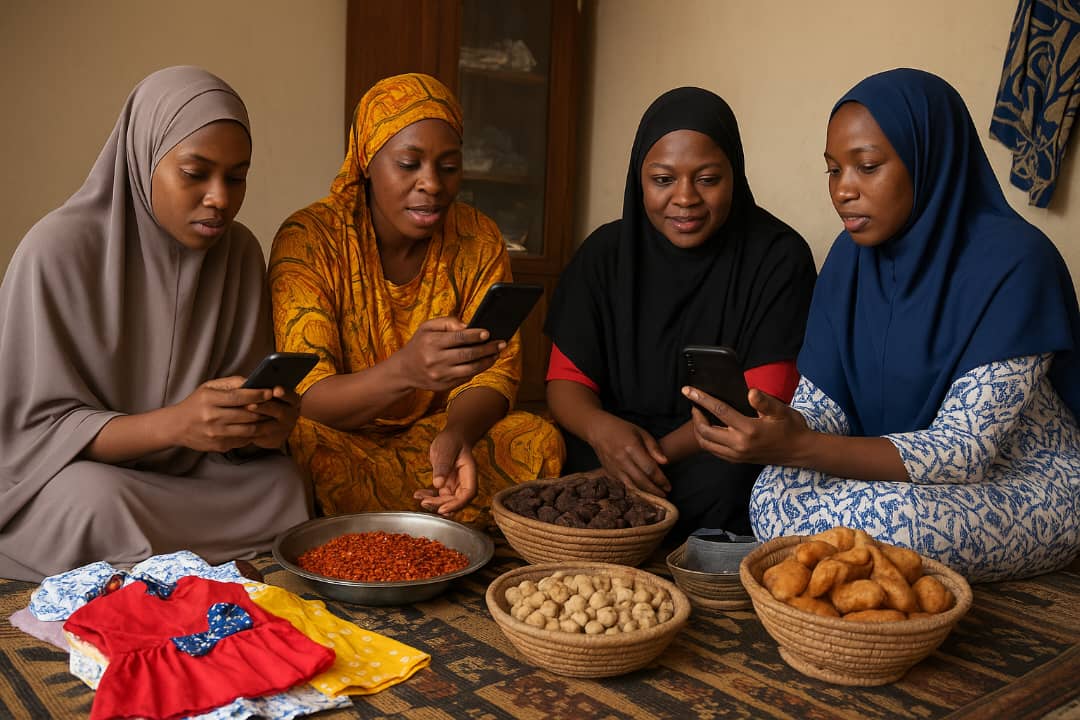Inside Maiduguri’s Social Media Market: Where vendors sell, hope, and survive

BY MUSA IDRIS UMAR, OCTOBER 15, 2025 | 11:50 AM
In a quiet corner of Maiduguri, Hauwa Ba’aba refreshes her WhatsApp status to see if anyone viewed her latest post — a new set of ready-to-wear dresses for children.
Like many others in the city, she relies on her phone to sell and stay connected.
Across Maiduguri, hundreds of small business owners now use the internet to reach customers and sustain their trade.
From handmade clothes to food, spices, and candy, these local entrepreneurs are rewriting what business means in a recovering city.
But behind every post lies a struggle with trust, visibility, and survival.
For Hauwa Ba’aba, who has been running her ready-to-wear clothing business for over four years, online selling is more than a choice — it’s a necessity.
'I wanted to reach more customers, not just people around me,' she said.
Yet, even with consistent posting, Hauwa faces one major challenge.
'Sometimes I feel people won’t see my posts,' she explained.
She has received no support from any government agency or organization but continues believing her brand will grow one day.
For Hadiza Ibrahim Ngulde, who started by selling bags and shoes before focusing on Yaji, the internet has helped her connect with people far beyond her area.
'Someone who doesn’t know you can see your product and buy,' she said.
However, building trust and handling deliveries remain her biggest problems.
'Not everyone who sees your product online will believe you,' she added.
When people finally trust her enough to buy, sending their orders safely becomes another test of patience.
Still, she keeps posting, sharing proof of transactions to strengthen credibility and attract new customers.
For Zainab Mohammed Mala, known as African Lady Stuffed Milk Candy, online selling has opened a new path for her creative business.
She began six months ago, producing stuffed milk candy filled with chocolate.
'The biggest challenge is from buyers who talk to you but disappear after showing interest,' she said.
Zainab also struggles with location-based bias.
'When they hear where I live, they lose interest,' she explained.
High delivery costs discourage both her and her customers.
For Ramlat Ahmad, CEO of Aficionado Chops, social media has helped her food business stay alive.
She has been running her small chops venture for three years, selling shawarma, burgers, meat pies, and tiger nuts.
'Throughout the years, I’ve used the internet because it brings many customers,' she said.
Ramlat has also dealt with fake buyers who make promises and vanish without payment.
Still, she keeps going.
'I love my business,' she said.
'Before you succeed, you must go through a lot.'
From these stories, one thing is clear — Maiduguri’s local entrepreneurs are not just selling products.
They are selling persistence, hope, and self-belief in a place where support is rare.
Despite little visibility, no funding, and no formal training, they keep building small digital empires from their phones.
Each photo, video, and caption is a step toward survival and recognition.
According to a local digital marketing expert, 'These women are showing what it means to innovate in tough times. With the right support, they could inspire a new wave of online entrepreneurship in the region.'
For now, their stories continue — powered by mobile data, creativity, and a dream that refuses to die.
Appeal for support
Conflict Reporting is dangerous and risky. Our reporters constantly face life-threatening challenges, sometimes surviving ambushes, kidnap attempts and attacks by the whiskers as they travel and go into communities to get authentic and firsthand information. But we dare it every day, nonetheless, in order to keep you informed of the true situation of the victims, the trends in the conflicts and ultimately help in peace building processes. But these come at huge cost to us. We are therefore appealing to you to help our cause by donating to us through any of the following means. You can also donate working tools, which are even more primary to our work. We thank you sincerely as you help our cause.
Alternatively, you can also email us on
info@yen.ng or message us
via +234 803 931 7767


